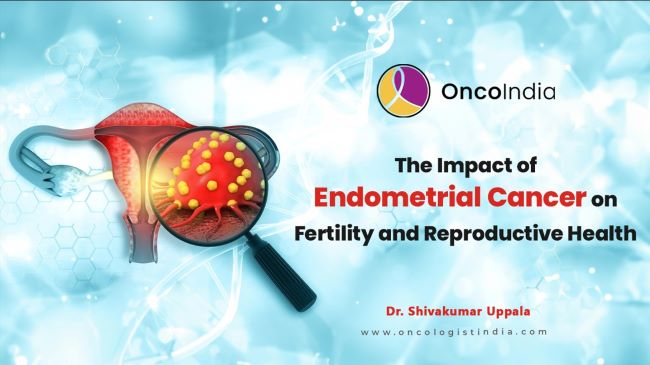Cancer can be an unexpected chapter that one might come across in one's life. It’s a battle you need to fight with yourself, both physically and emotionally. This journey, which is filled with uncertainty and resilience, weaves through the most delicate threads of life's most intimate aspects. Today we’re going to talk about one such type of cancer that can challenge the environment of fertility and reproductive health, which is Endometrial Cancer.

Understanding Endometrial Cancer
Endometrial cancer also known as uterine cancer occurs when cells in the lining of the uterus, called the endometrium, grow uncontrollably. The uterus is a hollow, pear-shaped organ in the pelvis where fetal development takes place. While this type of cancer primarily affects women after menopause, it can also occur in younger women.
Beyond the immediate health concerns associated with endometrial cancer, there is a profound impact on fertility and reproductive health that individuals facing this diagnosis must grapple with.
Symptoms of Endometrial Cancer
Endometrial cancer is often detected at a very early age because it shows signs like irregular vaginal bleeding. This type of cancer can be cured successfully if detected at an early stage and through the removal of the uterus. Following are some of the symptoms of uterine cancer:
Any bleeding after menopause is significant, as women often tend to overlook such signs. If there is any indication of excessive bleeding, it is crucial to seek medical advice promptly.
Any bleeding between menstrual cycles, whether in the middle age group or any age group, is also an important sign of potential uterine cancer.
Bleeding after sexual intercourse, known as post-coital bleeding, is typically associated with cervical cancers, though there are instances where it may also indicate endometrial cancer.
Women with a higher body mass index (BMI) are at an increased risk of developing endometrial cancer.
Patients taking tablets for breast cancer, particularly those undergoing hormonal therapy, are susceptible to endometrial cancer. Women cured of breast cancer, especially those who are hormone-positive and take tablets for 5 to 15 years, face an increased risk. Continuous monitoring, including screenings, ultrasounds, and biopsies in case of suspicious symptoms, is essential for early detection and proactive management.
Pregnancy after Battling Endometrial Cancer
Endometrial cancer, necessitating the removal of the uterus, poses challenges, as explained by Dr Shiva Kumar, an Oncologist at Trust in Hospital. Despite the removal of the uterus, he emphasizes that pregnancy remains a possibility through various approaches. One method involves retaining the ovaries, enabling future egg production post-cancer recovery.
In vitro fertilization, coupled with embryo transfer into a surrogate mother, becomes an option. For women who have undergone endometrial cancer surgery, surrogacy stands as a primary option.
Preserving ovaries via ovarian tissue cryopreservation during surgery is crucial, particularly if chemotherapy follows, as it may impact egg count. After recovery, a woman can utilize the preserved eggs for in vitro fertilisation, transferring the embryo to a surrogate if desired.
Post-recovery, normal sexual activity will not be hindered, and there will be no change in sexual drive or intimacy. Dr Shiva Kumar's insights offer a glimpse into the resilience and possibilities that can emerge even after navigating the challenges of endometrial cancer.
A Glimpse of Hope Amidst the Battle
A patient who was seeking treatment under Dr Shiva Kumar walked us through her experience with Endometrial. Cancer was an unexpected encounter in my life's journey. The diagnosis hit me like a tide, I was in a dark space about my life, especially when it came to planning a family. But amidst all the uncertainty, I found hope when seeking treatment under Dr Shiva Kumar from Trust in Hospital. He brought me a beacon of hope.
I was quite apprehensive about the removal of my uterus, but my Dr assured me that life could be still embraced in all its beautiful facets. He enlightened me about the possibility of pregnancy by retaining my ovaries.
When I was preparing myself for the surgery, the concept of ovarian tissue cryopreservation emerged as a lifeline. Knowing that my ovaries were cryopreserved allowed me to face the chemotherapy with a sense of empowerment, safeguarding the potential for future family planning.
Today, as I reflect on my experience, I am not just a survivor; I am a testament to resilience. If there is anyone out there going through a similar diagnosis, I assure you that there is hope, and most importantly, there is life after endometrial cancer.
Blog Reviewed By: Dr. Shiva Kumar Uppala